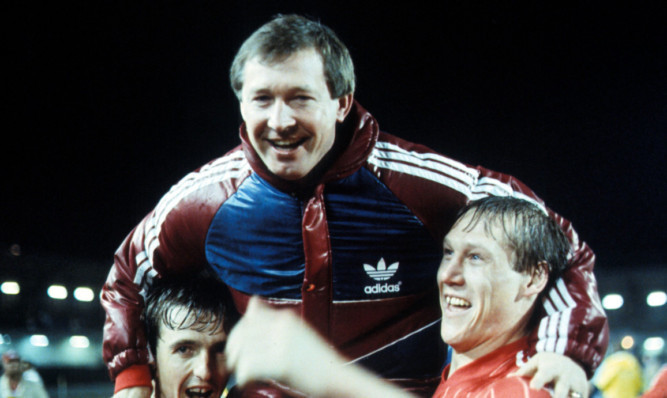
Bayern Munich and Real Madrid had the whole of Europe on the edge of their seats last week.
Bayern for the still unbelievable 7-0 aggregate victory over Barcelona, Real for coming within a goal of overhauling Borussia Dortmund and reaching the May 25 Final at Wembley.
It brought memories flooding back of Aberdeen’s epic European success in Gothenburg 30 years ago.
The Dons defeated both Bayern and Real en route to lifting the Cup-Winners’ Cup.
How things have changed. That sensational extra-time triumph remains the last time a Scottish club lifted silverware on the European stage.
The progress of time hasn’t dulled my memory of following Dons’ triumphant march across Europe that season, particularly their 3-2 aggregate elimination of Bayern in the quarter-finals.
Although Aberdeen were rightly praised for securing a goal-less draw in Munich’s Olympic Stadium, their number looked up as Bayern led 2-1 in the return leg at Pittodrie with time fast becoming the enemy.
Then Alex Ferguson (the knighthood would follow much later) made an outrageous substitution which led to the making of history.
To this day, Sir Alex still can’t explain the thinking behind withdrawing attacking right-back Stuart Kennedy to bring on midfielder John McMaster, a move that also required four positional changes.
Whatever, it worked.
McMaster and current Scotland manager Gordon Strachan effected their now famous free-kick drill to wrong foot Bayern and win the day.
The pair both made runs to take the kick, feigned anger at each other as they almost collided before Strachan quickly crossed to allow Alex McLeish a free header to equalise with the Germans still distracted.
The winner followed a minute later.
The rest is history and Aberdeen went on to win the Scottish Cup too with an extra-time victory over Rangers at Hampden 10 days later.
Instead of praising his players, however, Fergie said in a pitch-side TV interview: “No way can we take any glory from a disgraceful performance.”
Although he later apologised to his players, it demonstrated his hunger and desire, something that’s still evident at Old Trafford 30 years on, and which will be sorely missed now he’s retiring as manager.
It’s just a shame Fergie was lost to the Scottish game so long ago!

Enjoy the convenience of having The Sunday Post delivered as a digital ePaper straight to your smartphone, tablet or computer.
Subscribe for only £5.49 a month and enjoy all the benefits of the printed paper as a digital replica.
Subscribe